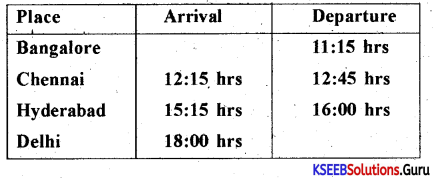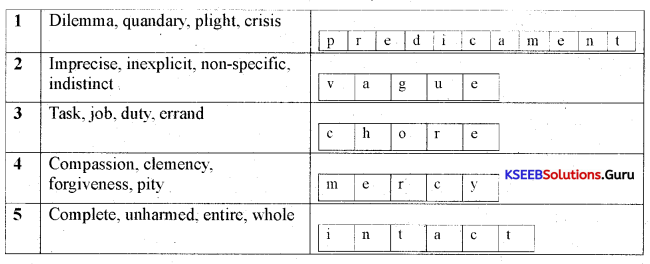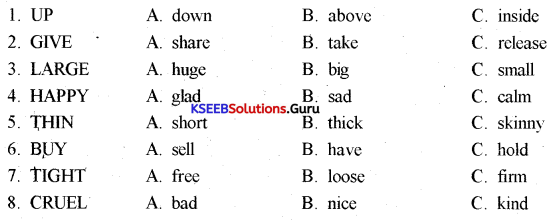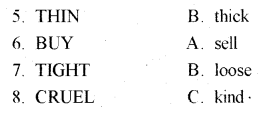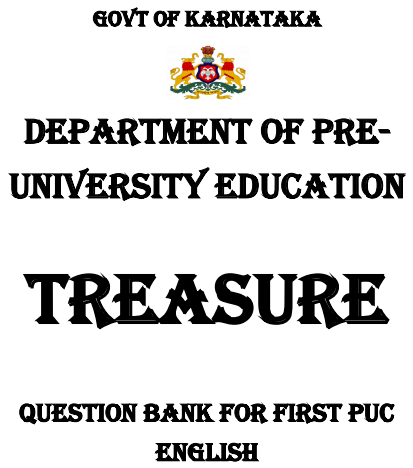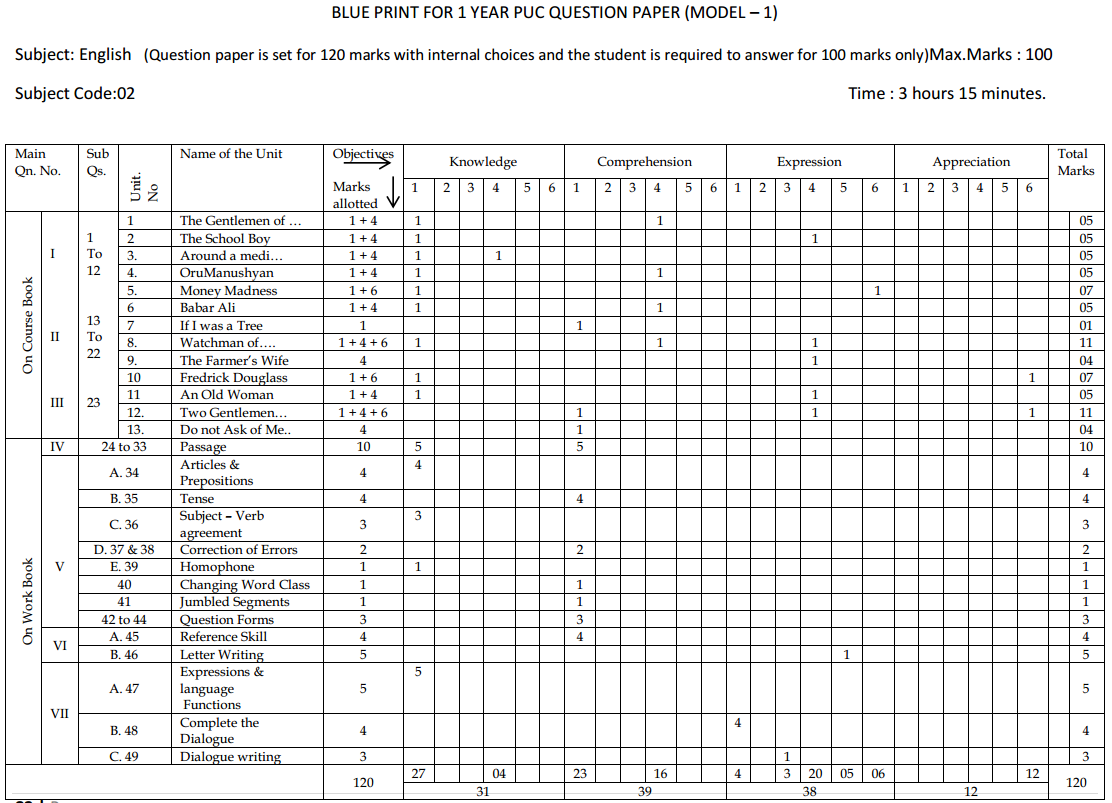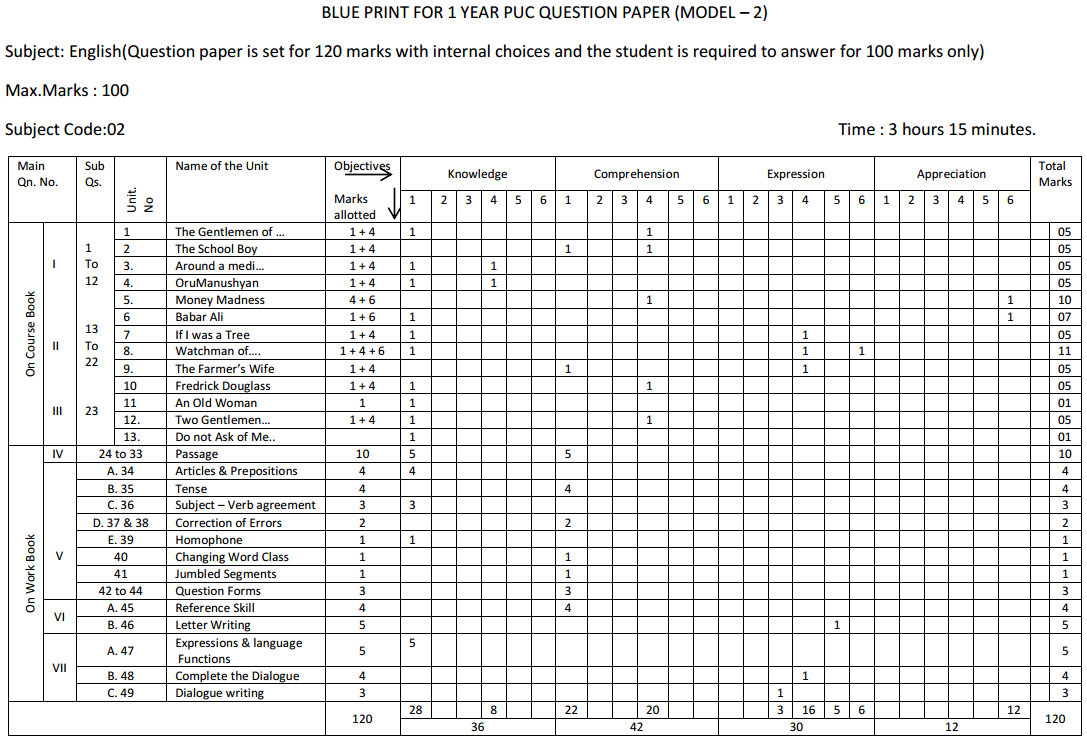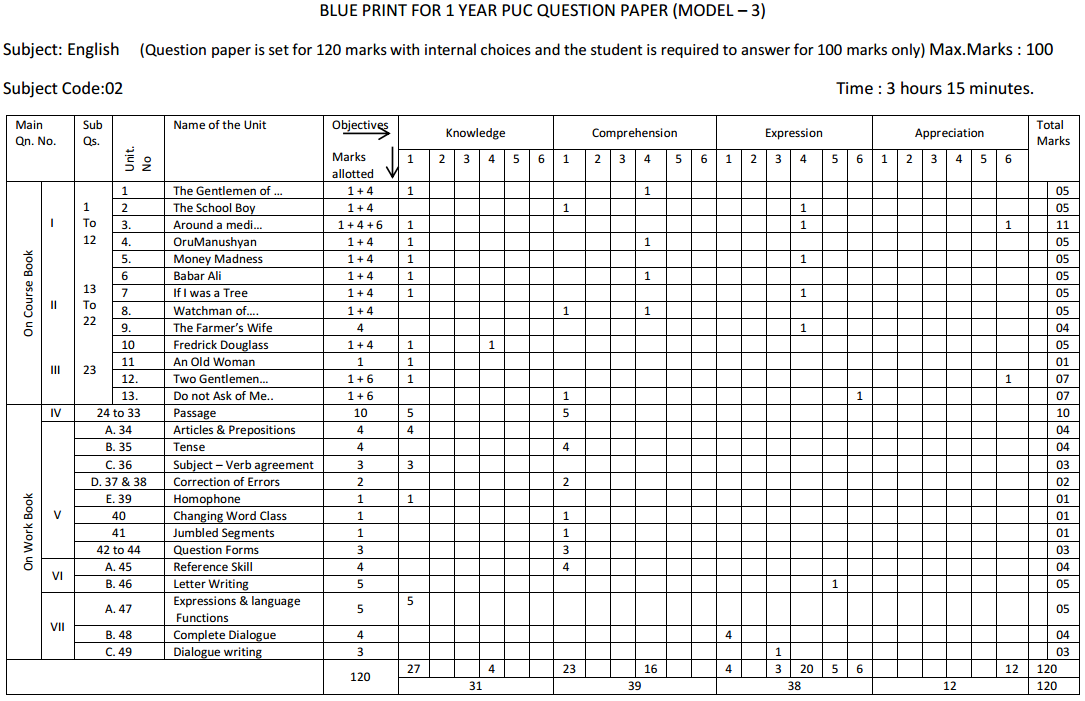Students can Download 1st PUC English Previous Year Question Paper March 2018 (South), Karnataka 1st PUC English Model Question Papers with Answers help you to revise complete Syllabus.
Karnataka 1st PUC English Previous Year Question Paper March 2018 (South)
Time: 3 Hrs. 15 Mins.
Max. Marks: 100
Instructions
- Follow the prescribed limit while answering the questions.
- Write the correct question number as it appears on the question paper.
- One mark question attempted more than once will be awarded zero.
- For multiple-choice questions choose the correct answer and rewrite it.
I. Answer the following in a word, a phrase, or a sentence each. (12 × 1 = 12)
Question 1.
Who was first called to give the evidence when the commission sat to take the evidence in ‘The Gentlemen of the Jungle’?
Answer:
Elephant.
Question 2.
In the line ‘I love to rise on a summer morn’ of ‘The School Boy’ ‘I’ refers to
(a) The huntsman
(b) The schoolboy
(c) The poet
Answer:
(b) The schoolboy.
Question 3.
According to Tejaswi, what is said to be on the verge of extinction in ‘Around a Medicinal Creeper’?
Answer:
India’s native medicinal systems.
Question 4.
Why did the narrator wake up at four in the evening in ‘Oru Manushyan’?
Answer:
To save the expense of drinking his morning tea or eating the noon meal.
Question 5.
According to the poet, how do the people feel when they hand out a ten-pound note in ‘Money Madness’?
Answer:
Tremor.
Question 6.
_______ is an illiterate fishmonger by morning and a crusading education is by afternoon in the lesson ‘Babar Ali’.
Answer:
Tulu Rani Hazra.
![]()
Question 7.
What did Bhima’s mother give Bhima to drink when he was a baby in ‘Watchman of the Lake’?
Answer:
Iron decoction.
Question 8.
What does the speaker wish to be in the poem, ‘If I was a tree’?
Answer:
Tree.
Question 9.
Farmer’s wife compares ‘The worm-eaten cotton pods’ to her.
(a) crops
(b) children
(c) husband
Answer:
(b) Children
Question 10.
What was a common custom prevalent in Maryland when Fredrick Douglass was a child?
Answer:
Separation of an infant from its mother.
Question 11.
Where does the old woman offer to take the narrator in the poem ‘An Old Woman’?
Answer:
Horseshoe shrine.
Question 12.
Why were Jacopo and Nicola waiting for the last bus from Padua in ‘Two Gentlemen of Verona’?
Answer:
To sell newspapers.
II. Answer any eight of the following in a paragraph of 50-70 words each : (8 × 4 = 32)
Question 13.
Why did the man protest on seeing the personnel of the Enquiry commission in ‘The Gentlemen of the Jungle’? How did the animals defend themselves in this matter?
Answer:
The commission of inquiry was Mr. Buffalo, Mr. Rhinoceros, Mr. Alligator, Mr. Fox, and Mr. Leopard. On seeing the personnel, the man protested and asked if it was not necessary to include, in this commission, a member from his side. But he was told it was impossible since no one from his side was well enough educated to understand the intricacy of jungle law.
![]()
Question 14.
Contrast the school boy’s joy in the summer morning with his experience in the school in ‘The School Boy’?
Answer:
The boy would love to rise early in a summer morning. He would love to hear the birds sing sitting on every tree. [le would love to hear the sound of horns of hunters at faraway places. He would love to sing with the skylarks accompanying him in his singing. All those sweet companies were welcome to him and make those mornings a pleasure to enjoy.
Question 15.
How did Mara lose all his teeth on the side of his mouth in ‘Around a medicinal creeper’?
Answer:
Once Mara had laid a trap in the forest to catch rabbits. He went into the forest before daybreak. No rabbit has walked into it. There was a stream flowing nearby, Mara decided to brush his teeth and wash his face. He broke a small stick from a nearby plant to brush a third or fourth time, he felt a sour taste in his mouth. He thought there was something wrong and took some water from the stream, and rinsed his mouth and all his teeth tumbled out of his mouth. Which was touched by the stick.
Question 16.
Give an account of the embarrassing experience of the narrator at the restaurant in ‘Qru Manusliyam’.
Answer:
Once. the narrator went to a restaurant with fourteen rupees in his act kept in the pocket and ate a full meal consisting of chapatis and meal curry. He drank tea. The bill was eleven annas. He searched his pocket to pay the bill but was shocked that his wallet was not in his pocket and someone had stolen it. When he said the same to the owner, the owner caught him by the lapels and ordered him to pay up. But as he did not have any money, he offered to keep his coat there and later ould bring some money and claim the coat. But the owner asked him to take if all his clothes. When he was removing them with great humiliation, a stranger came and helped the narrator by paving his bill.
Question 17.
Why did Babar Ali volunteer himself to begin a school in his village?
Answer:
Though children are provided free education, sending children to school is not entirely free of cost, Although children arc taught for free, they still have to pay for uniforms. books etc, Many families cannot send their children to school. Thus, instead of going to school. most of the boys help out their families borking in shops as day laborers, grass cutters, etc. Girls work as maidservants in the village, where they cook, clean, wash clothes and dishes for their employers Flabar wanted to change this: So he took the initiative of opening his very own school
Question 18.
How differently did Mara treat the fisherman and the visitor in ‘Watchman of the Lake’?
Answer:
Mara treated the fisherman in a harsh way because he had violated the command of the Goddess and the orders of the King that the place was sacred and no life was to be taken there. The fisherman was catching fish there. Mata warned him not to repeat the same crime again there. Mara’s duty was to look after the tank in a peaceful manner ensuring that no harm befalls any living creature there and the tank does not get polluted by man or beást. To the visitor from the farthest part of the kingdom, he spoke softly with kind words and offered him some food also: The visitor’s village was facing a water scarcity the crops were parching and cattle dying. He wanted some water to be let from the tank. Mata assured him that by the King’s orders, water was there for everybody to share and that he ill do the needful. It shows that Mata was strict while enforcing the rules but was fair and humane with people’s problems and reädy to help those in need.
Question 19.
Describe the predicament of the widow in the poem, ‘The Farmers Wife’?
Answer:
The poem “The Farmer ‘s Wife” i a tragic poem that reflects the helpless conditions of farmers & widows. The plight of the widows is explained by one such widow. The poet uses many phrases to contrast her condition with that of her dead husband. She called the farmer as virtuous’ and herself a ‘poor sinner’. The farmer was unable to pay the debts and he left all the debts to his wife, so she was very sad about his act of committing suicide. The feminist concept was also highlighted in the poem, the phrase “I was born with a head bent” justifies the discrimination in our society between men and women. Man is born with his head held high, but a woman is born with her head bent. But he did not face his creditors bravely and left all this to his wife to solve.
She accused her husband that he poisoned himself and gone away by poisoning his wife’s existence, She remembered the memories of his beating, blaming, drinking, and kicking haunting her. She never dreamt that he would commit suicide. It was true that the crop was gone but the debt remained there and dignity had hit the dust. She expresses her helplessness that how would she be able to bear the burden of their four children. She compared her condition with ‘worm-eaten cotton pods.” She got ambiguous and asked what was that and why he committed suicide.
At last, she confidently asserts her determination to struggle out her life even without her husband for the sake of her children. So, she shows a strong will to survive against all difficulties, Her voice is raised against society in general.
![]()
Question 20.
How is the plight of the old woman depicted in the poem “An old woman”?
Answer:
The poem “An old woman” depicts the worst condition of an old woman, who is an old beggar near the Horseshoe shrine. She holds the sleeves of the passers-b. and follows them asking for a fifty paise coin. Even though by appearance she looks like a beggar. she has her self-respect and in return for the fifty paise, offers to show the tourists around the Horseshoe shrine. She laments about her helplessness in those wretched hills to eke out a living.
Her physical appearance evokes sympathy in the passers-b. Phrases like “bullet holes for her eves. “cracks that begin around her eyes spread beyond her skin”, and shutter proof crone” describe the pathetic condition of her miserable existence.
Question 21.
Explain the role played by Nicola and Jacopo during the war in ‘Two Gentlemen of Verona’.
Answer:
War is the element of mass destruction. A bomb had destroyed their home and thrown Nicola and Jacopo into the streets. Their sister became a victim of tuberculosis. Nicola and Jacopo’s extreme youth and insignificant size, added to an intimate knowledge of the neighboring hills, made them immensely valuable. They were used to carry messages to the forces of liberation and, more dangerous still, to ferret out information on the movements of the German troops.
Question 22.
What harsh realities of life have drawn the speaker’s attention much more than the beauty of his beloved in ‘Do not ask of Me, My Love’?
Answer:
The poem “DO not ask of Me My love” by Faiz Alunad Faiz, presents the concept of love and contemporary issues of our society. The poem begins when the lover expresses his helplessness in not being able to love his beloved as in the past. He explains how she seemed so very bright when he had felt that only she was his world. He even exaggerates how her beauty had given breath to the everlasting spring. Her eyes were everything to him and nothing else was there except her in his world. He had felt that with her by his side, the world was his and he could attain everything.
But now, he has realized that all that was just an illusion and only his imagination. He gives as his reasoning his realization that there out ìn the wide world were issues. more important than his love for her. He is now more concerned about social problems, war, destruction, poverty diseases, and pain of people and would rather try and solve those problems than stay in his illusory world of love for his beloved.
He assures her that his love for her has not diminished, but the social problems have taken priority-justified by these lines, “You’re beautiful still my lovó, but I’m helpless too “. In a way, it is a message to all, that love in youth is quite common. but one’s country and social problems are more important and deserve concern and commitment from all. The speaker has opted for the more fulfilling choice of social reformation than his love.
III. Answer one of the following in about 200 words. (1 × 6 = 6)
Question 23.
Difficulties in life must not destroy one’s hopes and aspirations. Explain this with reference to Frederick Douglass’ life story.
Answer:
Since his childhood when he was under slavery, the author had strong willpower that he would not be a slave forever and he would escape from it, that was his strong faith and spirit in him. This living faith and spirit of hope make him say that “slavery would not be able to hold mc within its foul embrace” and this did not leave him but remained like a ministering angel to cheer him through the gloom. The author expresses his gratitude to God because God gave him a good spirit of hope.
OR
Bring out the significance of Mara’s dream and sacrifice in ‘Watchman of the Lake’.
Answer:
Mara’s sacrifice remains eternal in the history of men who saved lakes. He was the man who didn’t think about himself even for a single day but always about others. In other words. his social service is unforgettable to society. he is the great environmentalist whom the modem materialists must follow and adore to protect nature. Mara’s sacrifice of (leaving his body) taking his last breath is ultimate. Of course, today’s people cannot do that much but have to sacrifice a little of their wants and needs to protect nature. People should not pollute rivers in the name of ‘yatras’ and funerals. All superstitious beliefs and must be stopped now. Man must live according to his needs and not for his wants, For this, he has to follow the examples of tribals who live a contented life with whatever they get. They do not torture nature for coal or gold and live in a simple way. 1f men learn to lead a simple life that is the greatest sacrifice to protect nature from calamities.
OR
The poem, ‘If I was a Tree’ is a satire on social discrimination. Explain.
Answer:
The speaker wanted to be a tree because no one would discriminate against it and birds wouldn’t ask to what caste it belonged and sunlight would (approach) embrace it and its shadow wouldn’t be termed polluted. It can make friendship with the cool breeze, and raindrops would not go back by thinking that it is untouchable, The tree would feel happy with the touch of a sacred cow and it would get the opportunity of providing shelter for the hundred thousand Gods said to be residing in the cow, The tree can become pure when it iš cut into dry pieces and burnt in the holy fire and can help the sinless dead body by becoming a bier on the shoulders of four good men.
The poem describes the sense of equality present in nature, Sunlight and cool breeze treat everybody with love and spread their sweetness to all without discrimination. Unlike some humans who feel polluted getting in contact with the untouchables, nature has no such sense of superiority. ALt is equal in its eves.
The poem also presents social discrimination, as the speaker is much humiliated by the social discrimination and wanted to become a tree to escape from discrimination in society. He feels the safety, purity, and generosity, and helping nature of a tree more than in human beings. In a society man without thinking of helping others, thinks which is pure and which is polluted. He neglects and discriminates against some and appreciates others in name of caste, creed, and religion. So this practice is meaningless and the practice must be prohibited to sustain equality in society.
![]()
IV. Read the following passage and answer the questions set on it. (10 × 1 = 10)
Nelson Mandela, the world’s most famous political prisoner, was born in Umtata on 18 July. 1918. His father was the main counselor to the chief of the Themba Tribes. As a boy, he loved spending time with tribal elders. Hearing the stories of his ancestor’s valor during the wars, he too dreamt of making His own contribution to the freedom struggle. He met Walter Sisulu in Johannesburg, who helped him to join a law, Finn. At the end of the second world war, he and his friends joined the African National Congress youth league.
Mandela served over 27 years in prison, initially on Robben Island for 18 years, and later in Pollsmmor Prison and Victor Verster prison. An international campaign lobbied for his release. He was released in 1990, during a time of escalating civil strife. Mandela joined negotiations with president FW de Klerk to abolish apartheid and establish multiracial elections in 1994, in which he led the ANC to victory and became South Africa’s first black president. He published his autobiography in 1995. During his tenure in the Government of National Unity, he invited several other political parties to join the cabinet. During the negotiations, to end apartheid in South Africa, he promulgated a new constitution.
He also created the Truth and Reconciliation Commission to investigate past human rights abuses. While continuing the former government’s. liberal economic policy, his administration also introduced measures to encourage land reform, combat poverty, expand health care services. Mandela became an elder statesman, focusing on charitable work in combating poverty and HIV/AIDS through ’The Nelson Mandela Foundation.’
In 1991 the government repealed the last of the laws that formed the legal basis for apartheid. Mandela and de Klerk shared the 1993 peace prize for their efforts to establish democracy and racial harmony in South Africa. In 1994 Mandela became the first elected black president of South Africa in 1999 he retired from public life, returned to his hometown in the Transkei province to spend his remaining days in peace.
Question 24.
Who was called ‘The World’s most famous political prisoner?
Answer:
Nelson Mandela.
Question 25.
What did Nelson Mandela dream of as a boy?
Answer:
Making his own contribution to the freedom struggle.
Question 26.
What does the abbreviation ‘ANC’ stand for in the passage?
Answer:
Africa National Congress.
Question 27.
How many years was Mandela imprisoned in Robben Island?
Answer:
18 years.
Question 28.
What did Nelson Mandela do to end apartheid in South Africa?
Answer:
Mandela joined negotiations with president FW de Klerk.
Question 29.
Why did he return to his hometown in 1999?
Answer:
To spend his remaining days in peace.
Question 30.
He worked hard for the (expand) of health care services.
Answer:
Expansion.
Question 31.
Racial (harmony) can hinder the development of a nation. (Add a prefix to the word given in brackets to make it a meaningful sentence).
Answer:
Disharmony.
![]()
Question 32.
Name the organization which worked to combat poverty and HIV/AIDS.
Answer:
The Nelson Mandela Foundation.
Question 33.
Nelson Mandela and shared the 1993 peace prize.
Answer:
De Klerk.
V. A. Fill in the blanks with appropriate articles and prepositions given in brackets. (1 × 4 = 4)
Question 35.
We decided to conduct the experiment and brought _____ liter of milk. So we put____milk and leaves _______ a mixer and switched it on. We watched_______ some time to see whether it would become curdled or remain as it was.
Answer:
a the, into, for.
B. Fill in the blanks with the suitable form of the verbs given in brackets. (1 × 4 = 4)
Question 35.
The nurse ______ (lead) me through a cool, tiled vestibule into the hospital we _______ (go) upstairs to a balcony. The two boys_____(be) seated at the bedside of a girl and they________(smile) at her.
Answer:
lead, went, were, smiled.
C. Choose the correct form of the verb that agrees with the subject. (1 × 3 = 3)
Question 36.
This medicinal creeper________(has/have) small leaves resembling betel leaves. As it_____ (is/are) not seen for most of the year, they probably tie to a tree. It _________ (come/comes) up only in the rainy season.
Answer:
has, is, comes.
D. Correct the following sentences and rewrite them. (2 × 1 = 2)
Question 37.
Fresh juice is more better than soft drinks.
Answer:
Fresh juice is better than soft drinks.
Question 38.
Where they are going?
Answer:
Where are they going?
E. Rewrite as directed. (6 × 1 = 6)
Question 39.
He turned to me and said, “put on your __________” [Clothes/Cloths] [fill in the black with the appropriate word given in bracket]
Answer:
Clothes
![]()
Question 40.
The man gave_____(protect) to the elephant. [Complete the sentence with the right form of the word given in bracket]
Answer:
Protection.
Question 41.
Flower pots / in / grown / Bonsai plants/are. (Re-arrange the segments to form a meaningful sentence)
Answer:
Bonsai plants are grown in Flowerpots.
Question 42.
The Englishman took out his gun? (Add a suitable question tag)
Answer:
Didn’t he?
Question 43.
The narrator carried on a profession. (Change into question beginning with the right form of “Do”)
Answer:
Did the narration carry on a profession?
Question 44.
The narrator lived in a big city (Frame a question so as to get the underlined word as an answer)
Answer:
Where did the narrator live?
VI. A. Read the following TV schedule and answer the questions set on it. (4 × 1 = 4)

Question 45.
(i) Which channel would you watch to know about the latest films?
(ii) When can you listen to music on Chandana?
(iii) The Channel broadcasting a program on mass media is
(a) Chandana
(b) CNN-IBN
(c) NDTV
(iv) What program is telecasted at 7.00 am on CNN-IBN.
Answer:
(i) NDTV
(ii) 16-00
(iii) (c) NDTV
(iv) Our leaders.
![]()
B. Write a letter to your friend in Chennai requesting him/her to give you details about the computer courses available in his/her locality. (1 × 5 = 5)
Question 46.
Include the following points in your letter.
- The best computer teaching center
- Different courses available
- Fees structure
- Duration of the course.
Answer:
Akshaya Gupta
No. 22, 1 Cross
Gandhinagar, Bangalore-04
28 February 2018
Neha Choudhary
Swarny Vivekananda Nilaya
Vinobnagar, Chennai.
Dear Neha,
Hi. How are you? J am coming to Chennai to visit my grandparents during my summer holidays. I want to take up some computer courses. I request you to please give me details of the best computer teaching center in Chennai. I also would Like to get information about the courses available, fees structure and duration of the course. Do write soon. I am waiting to hear from you.
Your dearest Friend
(Akshaya Gupta)
VII. A. Match the expressions under column ‘A’ to its corresponding language functions under B. (5 × 1 = 5)
Question 47.
| A. Expressions | B. Functions |
| 1. Can I keep the book for few days? | (a) apology |
| 2. I don’t think ¡t would be possible | (b) gratitude |
| 3. We remain ever grateful to you | (c) greeting |
| 4. Hello, very good morning | (d) Seeking permission |
| 5. I ‘am extremely sorry for the delay | (e) disagreeing |
Answer:
(1)- d,
(2) – e,
(3) – b,
(4) – e,
(5) – a.
B. Complete the dialogue: (1 × 4 = 4)
Question 48.
Sneha: Hello, Pavithra. how are you?
Pavithra: ______________________
Sneha: How was your exam?
Pavithra: _________________________
Sneha: Don’t worry. You can do better next time.
Pavithra: _______________________
Sneha: No. I have to go home. Bye.
Pavithra: ______________________
Answer:
Pavithra: Hello Sneha, I am fine Thank you
Pavithra: I have not done so well
Pavithra: Will you come with me to my home?
Pavithra: Bye Sneha.
![]()
C. Dialogue Writing : (1 × 3 = 3)
Question 49.
Write a dialogue between a rider and a traffic policeman for riding without a license. Cover the following points.
- Underage rider
- Fine to be paid
- Request for an excuse.
Answer:
Traffic Policeman: Park your vehicle in this comer.
Rider: What is the matter, sir?
Traffic Policeman: What is your age?
Rider: 16 years sir
Traffic Policeman: You are an underage rider. You need to pay a fine.
Rider: Sorry sir, Please excuse me as my mother is hospitalized.


